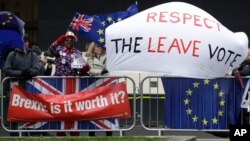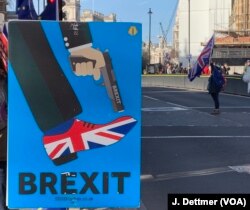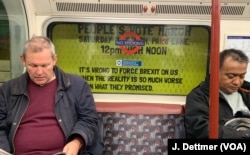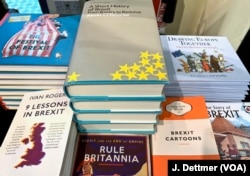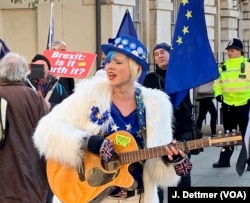The mood of British passengers on the Rome-to-London flight was somber.
They discussed whether they would still be European Union citizens the next time they fly to the Continent — and what hassles they will encounter at European airports, if they are not.
Most had a sense of foreboding.
“Back to la-la land,” said 32-year-old IT worker Chris Gray, as the plane banked over southeast England for its final approach. Complaining about the off-again-on-again Brexit, he added grimly, “How do they expect firms to plan anything?”
His company is thinking of relocating to Holland, one of 240 currently negotiating with a Dutch government eager to lure post-Brexit British business.
Other passengers were more bullish. “We’ll make a go of it,” said 52-year-old accountant Peter Smiley. He voted for Brexit because of immigration and he wants “Britain to govern itself again.” “They just need to get on with it — this confusion is making a joke of us,” he added.
Seldom in peacetime has Britain been engulfed in the kind of political uncertainty now roiling the country — a muddle shattering its reputation for competent and predictable government.
Five years before the 2016 Brexit referendum, a columnist at The New York Times marveled about how well Britain worked, noting it is “blessed with a functioning political culture,” one that eschews waging political warfare in absolutist or moralistic terms.
A changed country
That was then. Britain is a different place now. Theresa May’s Conservative government has been accused by critics of a “failure in statecraft” for its chaotic handling of Brexit.
Brexit is fraying the political and social fabric of the country, and not only splintering Britain’s storied political parties. Friends are breaking with friends over the issue. Families argue bitterly over the kitchen table. And Brexit has seeped into workplaces, which have become fraught with those holding opposing views shunning each other or walking on eggshells to avoid a squabble.
Brexit has even impacted the dating scene.
Relate, a relationship guidance counseling service, reported in the aftermath of the 2016 Brexit referendum a fifth of 300 practitioners from different charities said clients had mentioned the plebiscite as a problem in their relationship.
The stress of Brexit has prompted more Britons to pop anti-depressant pills, according to a study in the British Medical Journal.
Deja vu
The last time Britain experienced such almost existential turbulence was in the so-called “winter of discontent” in 1978, when public-sector trade unions mounted strikes and blockades to demand pay rises in an inflationary era following the imposition of pay caps by a Labour government led by James Callaghan.
Trash piled up; corpses remained unburied; the mood of the country, mired in the coldest winter for nearly two decades, was sour and bellicose. Ideological partisanship was sharp, government was adrift and the hapless Callaghan appeared to have lost control.
The country is not in the economic mess it was in back then, but it is in a deep political mess and rancor from top to bottom is rising and cleaving Britain in half, largely pitting young against old, south against north, rural against urban and educated against less educated.
According to a study of the Brexit referendum by the Joseph Rowntree Foundation, a think tank, the poorest households, with incomes of less than $26,000 per year, were much more likely to support leaving the EU than wealthier households, as were the unemployed, people in low-skilled and manual occupations, people and those with no qualifications. “Age, income and education matter, though it is educational inequality that was the strongest driver,” concluded researchers Matthew Goodwin and Oliver Heath.
Civility lost
Last week, a 68-year-old woman was attacked in the southwest English town of Swindon for distributing pro-EU leaflets. Fellow campaigner Steve Rouse told a local newspaper she had been targeted before “standing up to giant shouting men, towering over her calling her a traitor to her country, demanding she be jailed or even hanged, just for arguing against Brexit.”
Brexiters complain they are being harassed, too. Daily Telegraph columnist Janet Daley complained of what she says has been by Remainers “a systematic campaign of vicious abuse, the vileness and shameless snobbery of which I have never witnessed before in Britain.”
By the end of this week — another supposedly make-or-break one for Brexit — it may be no clearer how, when, or even if Britain will take the unprecedented leap into the dark and break with its largest trading partner.
Continental European politicians draw comparisons to the tradition of British pantomime as well as the slapstick humor of Monty Pythons to explain Brexit havoc.
“The UK under its current government has gone from central EU power player to complete basket case on the lunatic fringe,” tweeted Michiel van Hulten, a Dutch politician.
“You know you’ve hit rock bottom when the Germans mock you on primetime TV and the jokes are actually quite funny,” John Kampfner, former editor of the weekly magazine New Statesman, wrote recently. “The British brand is tarnished,” he fears.
Far from finale
Britain’s influential Economist magazine has lamented what it sees as the declining caliber of the country’s politicians, arguing, “Today it is as if Britain’s various elites have all decided, at exactly the same time, to stop sending their best people to Parliament.”
The consensus among analysts and lawmakers is that the Brexit saga is indeed in its endgame, but still far from a finale. Even if Britain leaves the EU on March 29 with a transition deal, that’s only the first stage. Thereafter it will start what will be prolonged negotiations on its future trading relationship with the EU.
Zain Sikafi, a 35-year-old medical doctor, says for many people the uncertainty and bitterness has upset the image of Britain being a functioning, quite orderly place. “Everyone is expecting someone in the great institutions we have, maybe even in Buckingham Palace, to sort this out in a more effective way. So that people can plan,” he says.
That seems a forlorn hope.
The government class is floundering amid deep divisions and sharply competing visions about Britain’s future, including its place in the World and what values should guide it.
In London’s Parliament Square there is no meeting of minds between dueling Brexiters and pro-EU Remainers on the eve of a series of important Brexit votes. Like most Brexit-debating Britons, the protesters shout past each other and do not attempt to seek common ground. And there is clear contempt for each other with both doubting the motives of the other.
No surrender
“It ain’t over until its over,” sings 24-year-old Madeleina Kay, a British writer and political activist from Sheffield, England. She uses the twitter hashtag #EUsupergirl and has crowd-funded her weeks-long presence in the square to protest Brexit.
Her song provokes the disgust of a stocky Brexiter. “If you love Europe so much, go and live in it,” he growls, stomping menacingly past her. That prompts shouts from Remainers, “We are living in Europe.”
No sooner have their shouts died down than former foreign minister Boris Johnson, a leading Brexiter, hurtles past on his bike. Several Remainers give chase. One calls out after him mockingly: “Not going so well then, Boris?”
“Someone is going to throw a punch,” sighs a policeman. He worries about the aggressive rhetoric, with Brexiters accusing Remainers of being traitors, and Remainers dubbing their opponents knuckleheads. Brexit politicians have warned of social unrest, if Brexit is denied and “stolen from the people.”
“That kind of talk is fueling trouble,” the policeman says. “I blame social media myself,” he adds.




